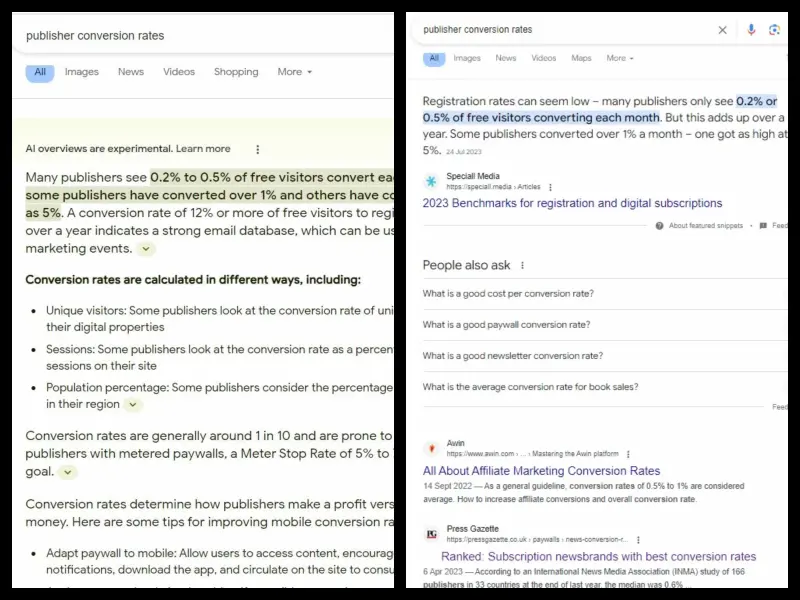
Last week we saw another raft of artificial intelligence announcements from Google and OpenAI. The latter has brought (not) Scarlet Johansson’s voice to a real-time speech-based assistant, sitting on its new model ChatGPT 4o (‘four-o’). The former with an underwhelming developer conference at which it unveiled – perhaps for want of something more interesting to say – a faster roll-out of ‘AI Overviews’ (or the technology formerly known as ‘search generative experience’). All US-based English language users will now see this feature.
AI Overviews really matter for publishers. This development presents consumers with a fully formed, natural language answer to a search query. It sits above the blue links on the search engine results page and is expressly designed to negate the need to visit another website.
As Google’s promotional video claims: “we do the work, so you don’t have to”. The marketing film goes on to show us how we can ask for some “kid friendly” activities in Dallas and be off to “Hopdoggy Burger Bar” followed by Dallas Zoo without a second thought.
[The image below compares how niche search term “publisher conversion rates” results in an AI-written article summarising publisher content on Google’s search engine in the US (left) while in the UK it results in a series of links to publishers, including Press Gazette.]
Google’s ‘grand bargain’ with publishers is now broken
The issue here is that AI Overviews only work because content creators, including publishers, have given Google permission to crawl their sites in order that they are indexed for search. This is a violation of the already-flawed grand bargain sitting between Google and publishers.
In the case of conventional search, the bargain goes something like this. We give Google access to our intellectual property, allowing the tech giant to create its core product, and in exchange Google delivers traffic which can then be monetised through advertising, subscriptions, events etc.
Putting aside the imbalance in bargaining power that raises questions about whether this is a fair deal, there is at least an exchange.
AI Overviews breaks this because Google isn’t delivering its part of the bargain: referral traffic. To make matters worse, Google doesn’t let content creators opt out of AI Overviews without also opting out of its core search product.
In the developer notes for search it tells us: “AI Overviews offer a preview of a topic or query based on a variety of sources, including web sources. As such, they are subject to Search’s preview controls.”
The final twist of the knife – as if one were needed – is that it is now serving ads against AI Overviews.
Just to clearly set this out: Google is using the access to publisher content which outlets have no choice but to give it – thanks to the gatekeeper position it holds in connecting us with audiences – to create a service which directly substitutes the use of our product. And then it is monetising that service through advertising, likely at the further expense of content creators. All without authorisation or payment.
An injustice and an abuse of market power
As well as being an injustice this is surely an abuse of market power. The French competition authority ruled against this conduct earlier in the year. That Google has chosen to continue acting in this way (it has actually significantly expanded the type of behaviour condemned) signals the extent to which the folks at Mountain View are spooked by the risks AI entrants present to its search monopoly.
Yes, this is about OpenAI. But also, I suspect, bout rival LLM Perplexity, which is more directly targeting search. As the incumbent, Google will know that the regulatory and legal backlash will come harder, faster and will have greater reputational impacts. The immediate downside risks to its core business of not acting this way, it must have calculated, are greater.
So what can publishers do about this?
How publishers can protect themselves from Google AI threat
I have been commissioned to model the mid-term commercial risks to UK news publishers from the deployment and adoption of AI. Whilst the full report has not yet been released (watch this space), it provides both a projected scale of impact for different categories of news publisher (which can be further refined on an individual publisher level) and strategic cues on how publishers can best protect themselves.
Whilst the precise optimal response for each publisher will depend upon the characteristics of their business model and content offering, there are three broad recommendations which would apply universally:
Firstly, and obviously, reduce your reliance on Google. Build direct relationships with your readers. Build communities. Expand your newsletters. Grow your database.
Secondly, be known for creating content that matters. For some search queries the source of the information being sought is of real consequence. Think if you’re choosing a car or getting interview advice. AI search is going to have lower utility in those circumstances as users will want information from brands they know. If your publication is trusted to deliver content of that nature, you will be afforded some protection.
Finally, distinctiveness. The utility of chatbots to answer queries about current events depends on their access to real-time information from providers of content. For some topics there is a scarcity of such inputs. Can you provide that information? And better still, be known and trusted for doing so?
Then there’s the commentary driving discourse; AI summarisation cannot supplant reading, first-hand, that columnist around which national, local or sectoral debate centres. Be the provider of that.
The media industry urgently needs regulatory intervention to stop Google’s conduct. In the UK, that doesn’t seem a near-term prospect (Lucy Frazer’s limp announcement of the Government’s desire to create a ‘framework or policy’ doesn’t instil confidence and the upcoming election makes that appear even more irrelevant).
In the absence of this, publishers would do well to decouple from the search giant and focus with precision on serving their readers’ high-stakes information needs with distinctive content.
Email pged@pressgazette.co.uk to point out mistakes, provide story tips or send in a letter for publication on our "Letters Page" blog

